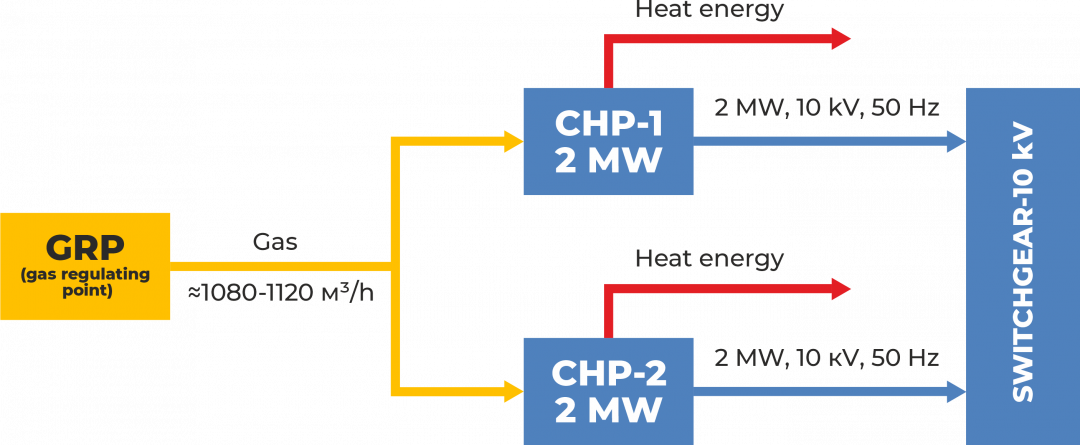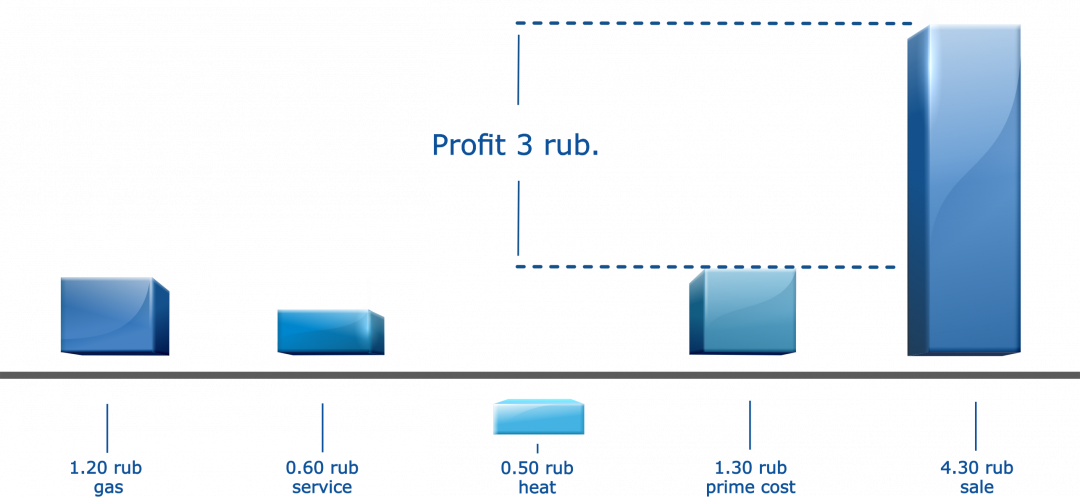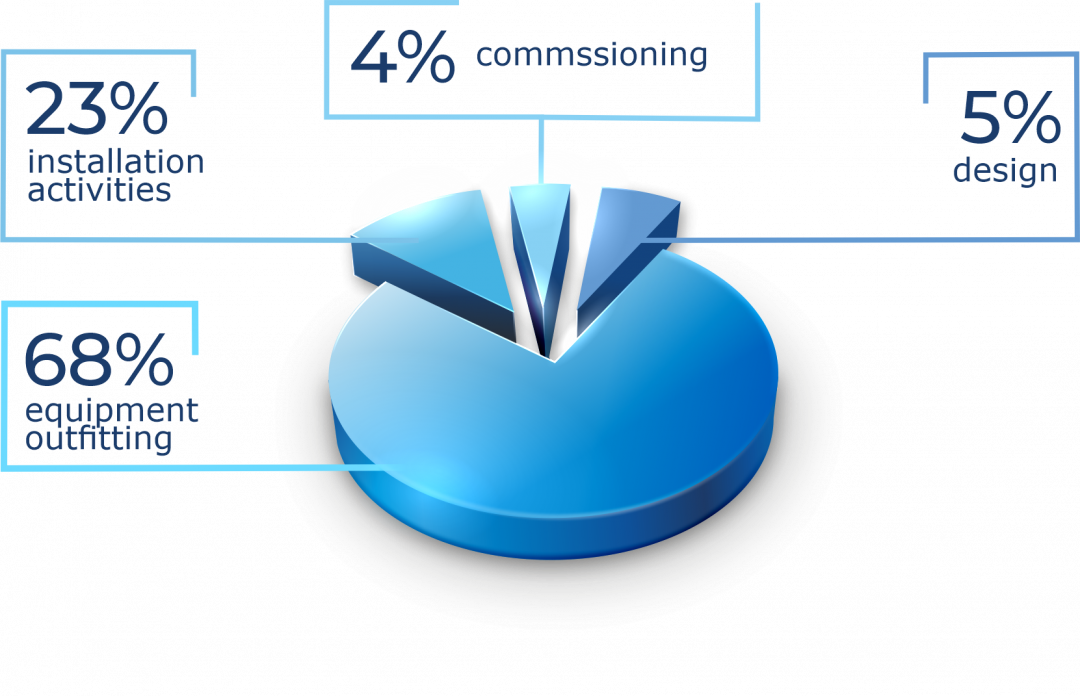What are gas piston power plants
Table of contents
A gas piston power plant (abbreviated as GPPP) is a complete, compact, autonomous and efficient generating facility for electricity and heat production. It is based on a gas piston internal combustion engine and alternator - gas piston unit (abbreviated as GPU).
The fuel for the engine is natural gas or other combustible gas of appropriate quality. The technology of operation of a gas piston power plant, which produces two resources simultaneously - electrical energy and heat - is called cogeneration. A gas piston power plant can also produce an additional resource - cold. This technology is called trigeneration.
Design of a gas piston power plant
The "heart" of the gas piston power plant is the MWM gas engine coupled on one shaft and mounted on one frame with the alternator. The plant is equipped with associated equipment necessary for normal operation. The design of MWM gas piston plants is based on the latest scientific developments and knowledge accumulated over 150 years of successful operation of the concern.
General view of MWM gas piston units: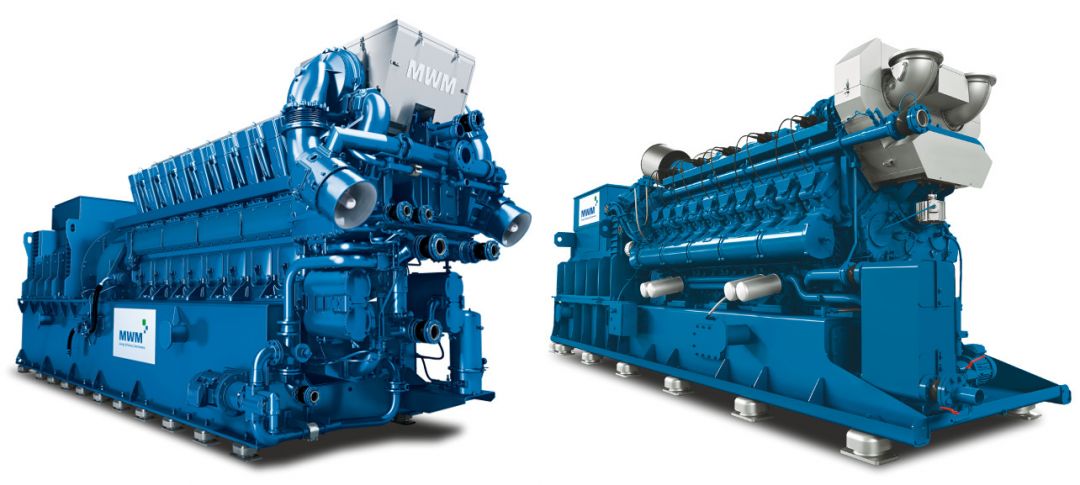
According to the customer's requirements, the complete gas piston plant is installed inside a block module (container) or stationary (in a building). The power plant is equipped with the necessary systems and auxiliary equipment to ensure the required operating conditions of the gas turbine unit, as well as the requirements of regulatory and technical documentation.
Main engineering and safety systems:
- fuel supply system;
- smoke extraction system;
- oil supply system;
- ventilation system;
- heat mechanics system (including heat recovery system);
- electromechanics system;
- automation system;
- communication system;
- fire alarm and fire extinguishing system;
- and others.
Principle of operation of a gas piston power plant
The combustible gas of the required parameters is supplied to the gas piston engine. In the process of fuel combustion, mechanical energy is generated, which is transmitted via a single shaft to the generator and converted into electrical energy of standard quality parameters. The generated electrical energy is transmitted via cable lines to the generator switchgear of the required voltage level (generator cell) with subsequent distribution to the existing switchgear of the power system of the customer's enterprise.
During the operation of the plant a large amount of heat is released (engine cooling jacket, exhaust flue gases, heated oil), which is removed by means of heat exchangers and utilization boilers (associated heat recovery system). The generated heat energy is supplied to the existing heat network of the enterprise. If the associated heat from the power plant is not utilized, the heat energy is discharged into the atmosphere.
General scheme of the technological process:
The points of connection of the gas piston plant to the existing power supply system of the enterprise are specified at the stage of design work and depend on the existing scheme of electricity, heat and gas supply of the enterprise.
Operating mode of the power plant
Depending on the customer's operating conditions, the gas piston power plant can operate in two modes in relation to the external power system:
- Autonomous mode - external networks are absent or will be disconnected, power supply is provided by the GPPP.
- Parallel mode - the power plant operates in parallel with the external grid, power supply is provided from two sources. This is the most reliable and frequent mode of operation. At start-up, the power plant is synchronized with the grid benchmarks. However, it is necessary to clearly control and exclude backflow of generated electricity to the external grid, which is a requirement of grid companies when connecting HPPPs.
Fuel
Gas piston units operate on various types of combustible gaseous fuel. The most common and efficient fuel is natural gas.
Other possible gaseous fuels are:
- landfill gas;
- biogas;
- associated petroleum gas;
- mine gas;
- cleaning gas;
- mine gas;
- coking gas;
- liquid gas (propane, LNG), etc.
When using alternative gaseous fuels, it is necessary to analyze the gas in advance, check the gas composition and parameters for compliance with the manufacturer's requirements.
Heat recovery system
The heat recovery system allows to remove the associated heat from the running engine by means of heat exchangers and heat recovery boilers.
The system makes it possible to obtain heat energy of the required parameters:
- Hot water - standard temperature schedule 90/70°C, hot water heat exchangers and HRSGs are used. If necessary, the parameters can be increased using peaking boilers.
- Saturated steam - HRSGs are used for standard parameters. If necessary, steam can be superheated by means of superheaters.
3D visualization of a possible arrangement of GPU and HRSG:
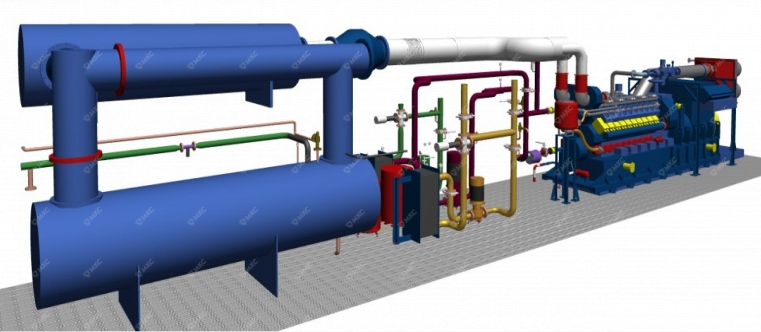
Design of gas-piston power plants
The design of a power plant refers to the type and nature of its installation at the customer's site, since the outdoor position of the gas-piston power plant is not expected. Depending on the customer's requirements and the conditions of installation of the power plant at the enterprise, two main types of gas piston plants are distinguished:
Block-modular version - the GPU with all auxiliary equipment and systems is installed inside a fast-built compact block-type building with a modular arrangement of the main equipment (GPU) and auxiliary systems.
Stationary version - the GPU with all auxiliary equipment and systems is installed inside a capital building.
Block-modular version significantly reduces the time of commissioning of the facility and the cost of its realization, and also has no strict limitations on A block-module can be dismantled, moved, assembled and put into operation within a few weeks.
Example of a block-module power plant manufactured by MKS Group of Companies:
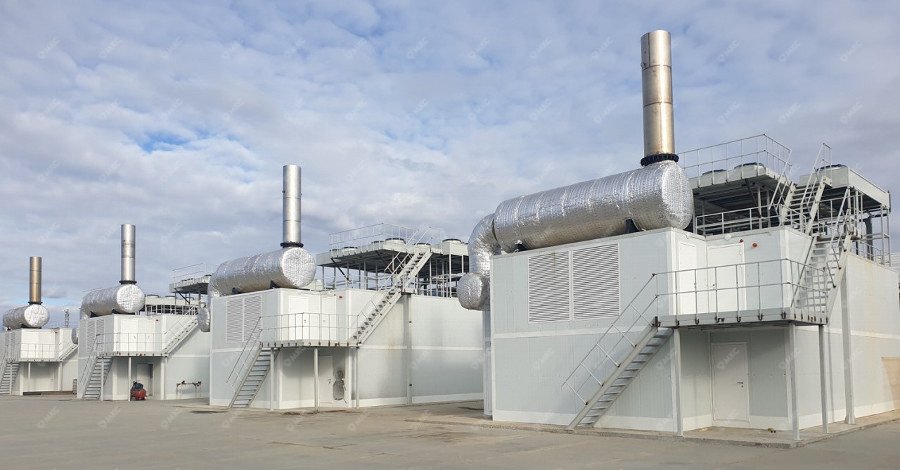
An example of a stationary power plant manufactured by the MKS Group of Companies:
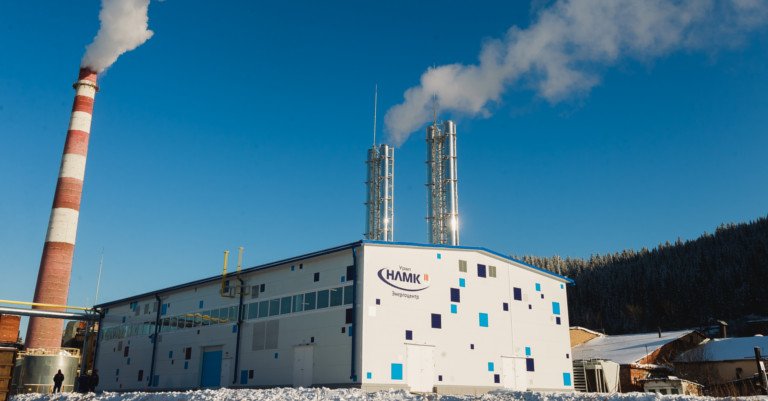
Advantages of block-modular design of gas piston power plants
Block-modular design of gas piston power plants has a number of advantages compared to other types of designs:
- Quick start-up - a 4 MW mini-HPP can be assembled and launched in 15 days.
- Cost optimality - block assembly and pre-prepared modules allow to significantly reduce the cost of the project.
- Mobility - the possibility of operative transfer of the mini-HPP to a new installation site.
- Simplicity of capacity increase - block-modular design allows to promptly increase the power plant capacity by installing additional modules.
- Simplicity of repair - block-modular design allows to promptly dismantle the engine for repair or perform repair on site.
- Ease of transportation - block-modules are manufactured in dimensions ensuring fast and inexpensive transportation by any means of transport.
Realization of gas piston power plant projects
When realizing gas piston power plant projects, the main attention is paid to the quality and complex of rendered services, that is why, as a rule, such projects are realized by engineering companies performing the whole complex of works "on a turnkey basis" - from design and survey works to commissioning of the facility and its maintenance.
The following diagram shows an enlarged block diagram of the process of turnkey construction of a GPPPs by one of the leaders of the small-scale distributed power generation industry in Russia - MKS Group of Companies.
Each stage of this technological chain is very important, impossible without others and requires the highest competence of the performers. Obviously, if all the work is performed by one company on a turnkey basis, the final cost of such an object will be lower than if each stage was performed by different contractors. Also, a single contractor will control the quality of work at each stage, which cannot be said about several contractors, where each is responsible only for their specific volume, and not for the project as a whole.
Design
Implementation of design and survey work is one of the most important stages of the implementation of a gas piston power plant. It is at this stage that the main technical solutions are formed, design documentation is issued and agreed upon, and the visualization of the entire object and individual units is designated.
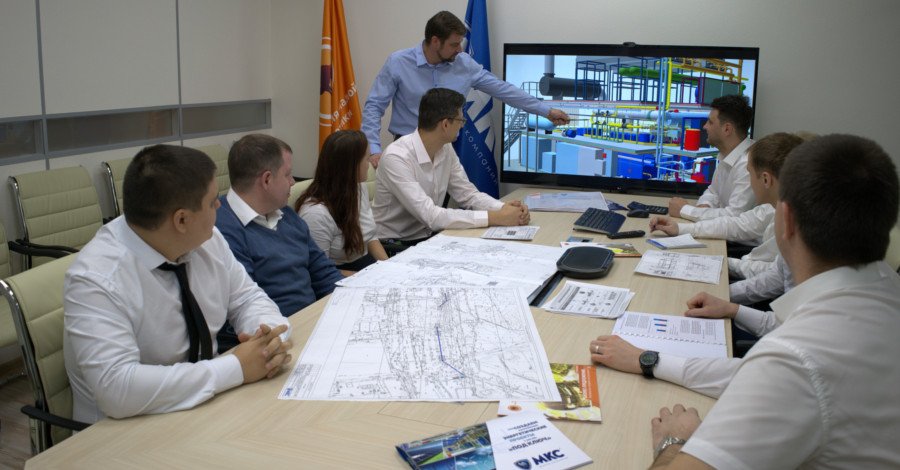
MKS Group of Companies as one of the leading engineering companies in Russia provides quality services in the field of design of power facilities of different complexity.
Supply of equipment
Depending on the customer's needs and project implementation conditions, a specification of the scope of supply of the main generating equipment - gas piston plant - is agreed upon. MWM GPUs have a variety of technical characteristics that allow to cover almost any needs in electric power.
MKS Group of Companies is an official dealer and service partner of MWM - one of the leading brands in the production of cogeneration gas piston units for autonomous power supply. From 2017 to 2019. MKS Group is the No. 1 dealer in Russia in terms of MWM engine sales.
Production
After ordering the main equipment, it is necessary to package it - to link the equipment and all the systems necessary for operation inside the block module, to make the necessary supporting and enclosing structures (including the block modules themselves), to manufacture additional equipment. The equipment should arrive at the customer's site in maximum factory readiness.
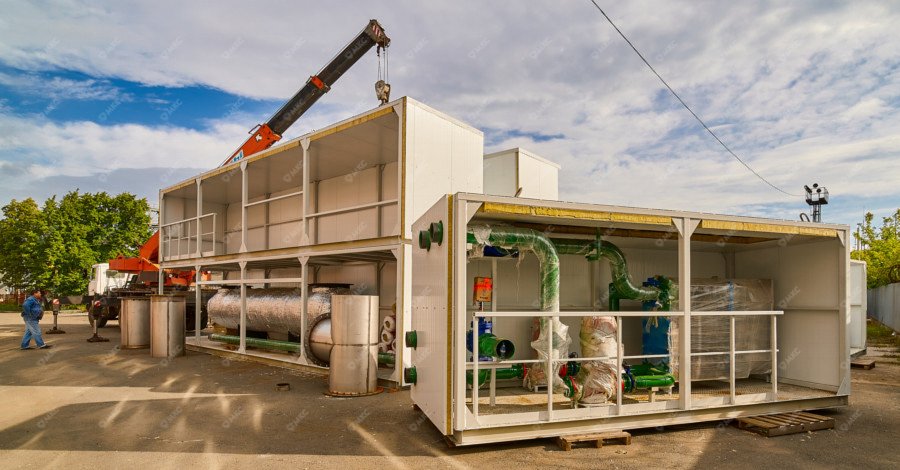
One of the competitive advantages of MKS Group is the availability of its own production facilities located in Chelyabinsk, where the development and manufacture of block modules and packaged gas piston units of various capacities are carried out: 4.5 MW, 2 MW, 1.2 MW, 0.6 MW.
Construction and installation works
Construction and installation works at the customer's site include the following main types of works: excavation works, arrangement of foundations, construction of buildings and structures, installation of process equipment, installation of block modules and containers, construction of linear and network facilities, organization of fences and access roads, landscaping, etc.
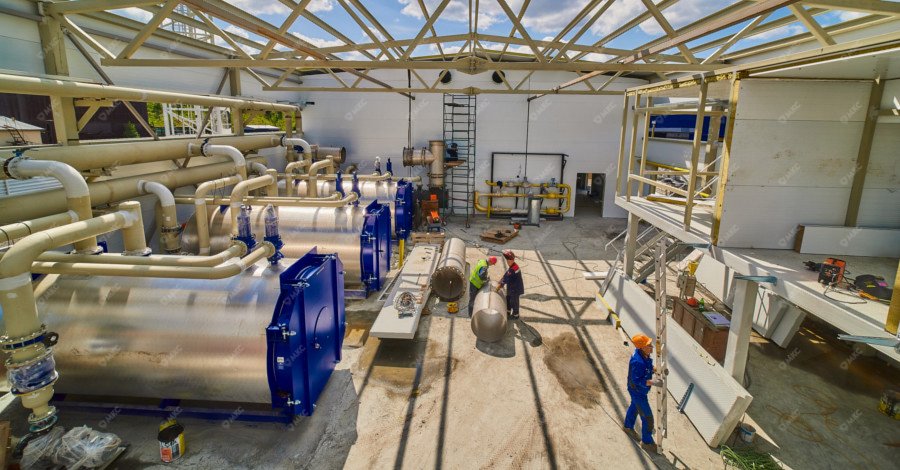
MKS Group is authorized to perform a wide range of construction works and offers complex and efficient solutions to the customer.
Pre-commissioning
Commissioning is the final stage of the project realization. At this stage, under the supervision of engineers representing the GPU manufacturing plant, comprehensive testing, testing and commissioning of the equipment is carried out, and laboratory tests of auxiliary equipment are performed. The main task of commissioning is to check all modes of operation of the GPU at idle and under load, to ensure that the equipment reaches its nominal operating parameters.
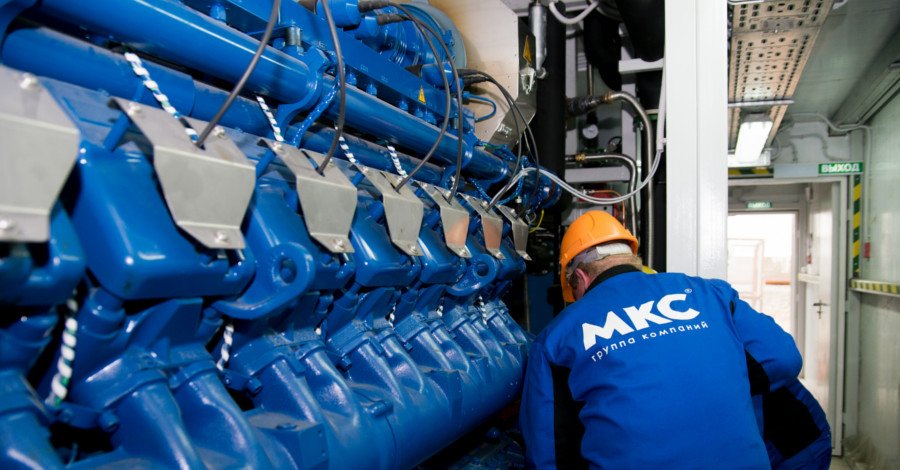
MKS Group of Companies provides a full range of commissioning works at facilities of any complexity.
Dispatching and monitoring
At the customer's request, the engineering organization can perform remote dispatching and monitoring of generating equipment operation in real time from a single control room. This type of service makes it possible to improve reliability of GPPP operation and promptly respond to any changes in equipment operation.
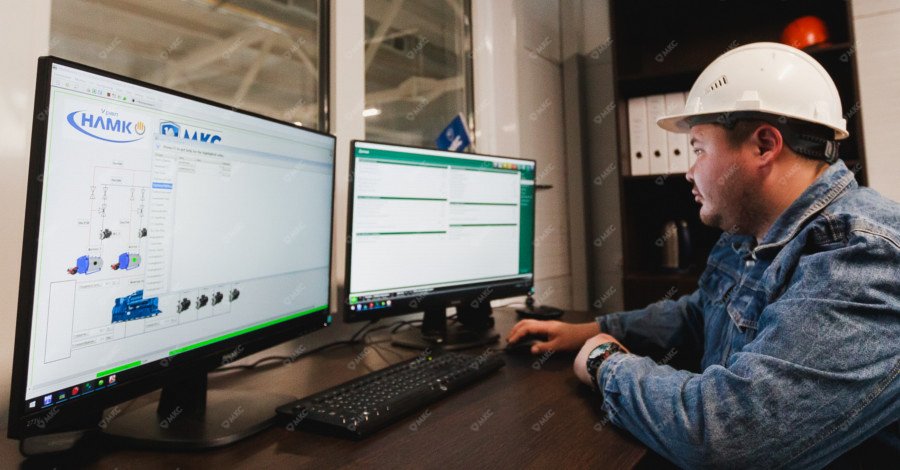
MKS Group offers remote dispatching and monitoring services for new or existing gas piston power plants.
Service maintenance
Operation of a gas piston power plant is not a simple matter and requires high competence and technical level of employees from the owner. Therefore, in most cases, owners of mini-HPPs conclude long-term contracts for service maintenance and operation of the generating equipment. An additional advantage is if the servicing organization is an official dealer or service partner of the manufacturing plant. This allows you to get the most optimal prices for spare parts, reduce the time of their delivery, as well as improve the quality of services.
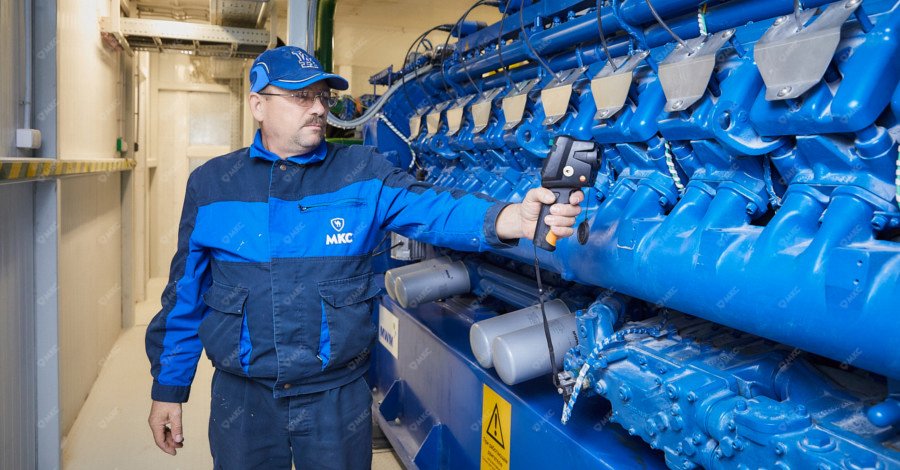
Гhe MKS Group of Companies provides service maintenance of commissioned power equipment in various regions of Russia and abroad.
Advantages of gas piston power plants
The greatest benefits from the use of gas piston power plants can be obtained only with a set of services: delivery of original generating equipment from the manufacturing plant and performance of all works on the implementation of the turnkey facility.
The largest manufacturers of gas piston plants in the world are MWM, Caterpillar, Jenbacher, Cummins, Man and others. MWM gas piston units have a number of advantages compared to other generating units or GPUs of other brands:
maximum electrical efficiency among the plants of its class (up to 48%);
possibility of obtaining relatively free by-products (cogeneration and trigeneration);
low cost of electricity generation;
optimal cost of the plants;
wide range of rated capacities of the plants;
long service intervals and maximum operating time before overhaul among units of its class;
compactness, possibility of block-modular design;
environmental friendliness and safety meeting European standards;
optimal costs for service and operation;
quick payback of projects.
Economics of gas piston power plants
One of the main criteria for installing gas piston power plants is to reduce energy supply costs. The economic effect of using a gas piston power plant is related to the location of the generating facility in close proximity to the consumer - the power supply is made at the cost price of the generated electricity, which in most cases is much lower than the purchase price from the market.
The following diagram shows the approximate structure of unit cost and economic effect for the consumer when using HPPP. As a result, the consumer is able to receive electricity much cheaper than from a guaranteed supplier.
In this connection, the projects of realization of gas piston power plants now have a rather attractive payback period for the enterprise-consumer - up to 5 years. At the same time, the implementation period of such projects is usually within one calendar year. In comparison, the technological connection of a new powerful production facility to external power grids can take up to several years, especially if the construction of new lines and substations is required.
Large distribution networks to which a new facility is connected are rather static and slow to change or build their networks. Often large consumers have to pay a lot of money for such connection in order to compensate the grids for their costs. In this context, the realization of a GPPP project becomes not only affordable, but also obviously profitable and logical.
Cost of gas piston power plants
she advantages of gas piston power plants for consumers are obvious, but every business owner knows how to count money, especially his own, so the issue of the cost of implementing such projects always remains one of the main ones. According to average estimates of engineering companies organizing the implementation of mini-HPP projects, the approximate unit cost of turnkey construction of such a facility is about 600-650 euros per 1 kW of installed capacity. These prices are absolutely competitive in terms of obtaining the above-mentioned advantages, and competent businessmen understand this.
Approximate aggregated cost structure of a turnkey HPP project:
Safety and environmental friendliness
Pollutant dispersion
The main generating equipment of the HPPP is a source of pollutants. When operating with natural gas, the pollutant emissions (NOx) for MWM plants are less than 500 mg/Nm3.
The level of pollutant dispersion is determined by calculation method based on specific actual conditions and the main regulatory requirement - the flue cut of the HPPP chimney should be higher by 3 m than the back pressure of the nearest building.
Noise impact
The main noise generating equipment of the HPPP is the GPU internal combustion engine, ventilation system fans and dry cooling tower fans. The largest source of noise is the combustion engine of the HPPP. With the block-module design, the engine is located inside the block-module assembled from sandwich panels having noise-absorbing characteristics (according to the data sheet) of about 31-32 dBa. Thus, the noise of the GPU internal combustion engine behind the block module is significantly reduced. Depending on the distance from the HPPP installation site to the nearest structure outside the Customer's facility, a non-linear noise level reduction is achieved. Calculations of noise level and sound pressure are made according to GOST 31295.2-2005 / ISO 9613-2:1996. Additionally (if necessary), other means of protection against physical impact of the gas piston power plant can be used.
MKS Group of Companies is a leading engineering company in Russia, the main activity of which is construction of small-scale power generation facilities - turnkey gas piston power plants. For 14 years it has commissioned 53 mini-HPPs in different regions and abroad. The total capacity of all commissioned facilities of MKS Group amounted to 244 MW. MKS Group is the official Russian dealer and service partner of MWM Austria GmbH.
© MKC Group of Companies LLC, 2019
 ru
ru en
en